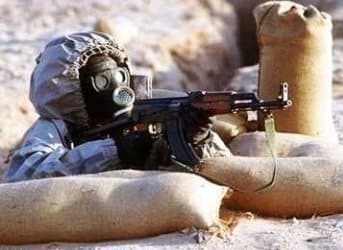The conflict in Syria has taken a turn for the worst this week amid fears that the beleaguered regime of President Bashar Assad may resort to the use of chemical weapons as a last resort to avoid being overthrown by a growing rebel force.
There were reports of very heavy fighting in and around the Syrian capital, Damascus, this past week as the government deployed airplanes, armour, and heavy artillery against rebel forces and severed all communication links to the outside world, including the Internet, telephones and air transportation.
There are great fears that the Assad regime may use chemical weapons to try and change the tide in this on-going two-year civil war that has claimed more than 30,000 lives and forced more than 500,000 Syrians to become refugees.
Fear regarding the use of chemical weapons is not new but there is a distinct possibility they may yet see the day. There is indeed, a very real possibility of such chemical agents being used in Syria as the conflict evolves. The civil war in Syria is reaching critical mass and there are good reasons to worry. As the rebellion grows and consolidates its positions, infringing gradually on government positions, so does the fear of new weapons being introduced.
The CIA believes Syria has had a chemical weapons program for years and already has a stockpile of CW agents which can be delivered by aircraft, ballistic missile, and artillery rockets.
Related Article: Who Should be Doing the Geopolitical Heavy Lifting in The Middle East?
Syria, like all countries who include biological and chemical weapons in their arsenals, has been highly secretive about what exactly it does have and how many of these extremely lethal weapons it does have. Western intelligence reports believe the Syrian government possesses mustard gas and sarin. Those are highly toxic nerve agents.
According to published reports the CIA also believes that the Syrians have also tried to develop more toxic and more lethal nerve agents, such as VX gas.
The BBC sites a report based on Turkish, Arab and Western intelligence agencies that put Syria's stockpile at approximately 1,000 tons of chemical weapons, stored in 50 towns and cities.
The Syrians have not signed the Chemical Weapons Convention (CWC) or ratified the Biological and Toxin Weapons Convention (BTWC), although at this juncture in the conflict it would make little difference.
The Obama administration has warned the Syrian president not to use chemical agents and that it would be held responsible if it did. However, as the pressure mounts as does the tension, there are no guarantees that the regime, feeling more threatened every day, will not, in a moment of despair, resort to what it may regard as a last resort to save itself.
Iraq’s former dictator had used chemical agents against the Kurds in northern Iraq with devastating consequences.
In another related development Turkey, a NATO member, asked the Alliance to deploy Patriot missiles along its border with Syria, a move NATO is seriously considering.
Related Article: Oil Production and Violence in The Middle East
The danger of course in so doing, while protecting Turkey, as it should, at the same time adds more elements to a highly volatile situation. An attack by Syria on Turkey would be equivalent to an attack on all members of the North Atlantic organization. While in essence all members of the Alliance are obligated by its charter to help defend the group, in reality it would boil down to US, British and possibly French troops fighting on the ground, if ground forces would have to be deployed, which they probably will have to. Other member countries would contribute in support operations such as services, transportation and logistics, as has been the case in Afghanistan.
France was the first country to officially recognize the Syrian government in exile. As such Paris could respond favorably to a request for military intervention from the opposition.
An attack by foreign forces could at that point be the trigger that would make President Assad resort to deploying bio/chemical agents, though that would be unlikely given that the response from a Western military power to the deployment of bio-chem weapons would be utterly devastating. Indeed, the fear at this juncture is more that those weapons would be deployed against civilian populations and/or against rebel forces, which in turn would affect the civilian population seeing the military forces on both sides of this conflict are deployed in and around civilian population centers.
Another question worth asking at this point is what would be the reaction in Tehran to, first the use of chemical agents in Syria? And second, what would be the reaction in Tehran to a Western military intervention in Syria? Iran has repeatedly stated during these past two years of civil war in Syria that is would stand by its ally and friend.
By Claude Salhani
Claude Salhani, a specialist in conflict resolution, is an independent journalist, political analyst and author of several books on the region. His latest book, 'Islam Without a Veil,' is published by Potomac Books. He tweets @claudesalhani.


















